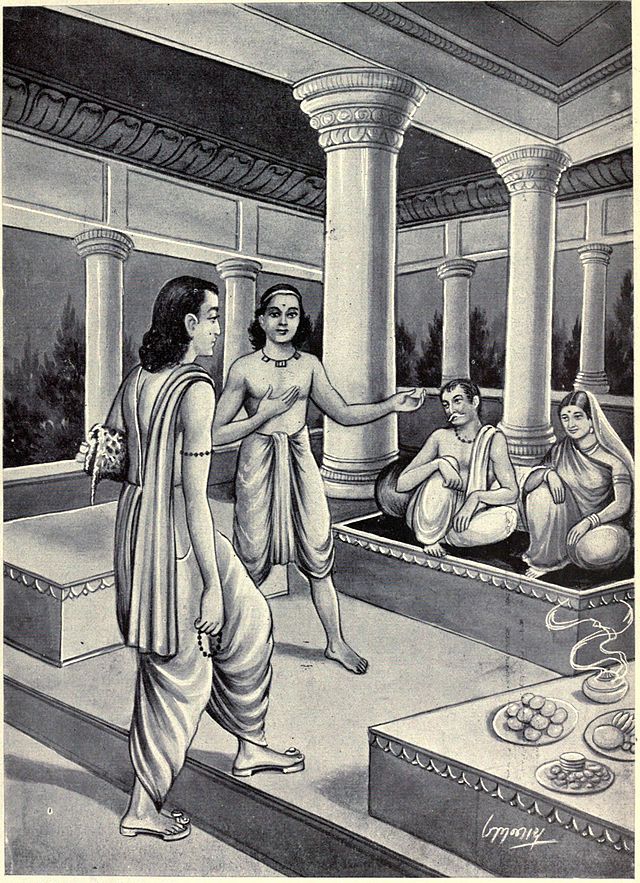The Mahabharata has lessons on virtually every subject. Dharma is the principal concept you will find throughout the epic. While the main story of the epic itself presents different perspectives on Dharma, the minor stories also are an important part of the epic.
The minor stories or the Upakhyanas are many. All of these upakhyanas are included with the purpose of conveying a lesson. The lesson is being conveyed through the narration to the characters in the Mahabharata. They are also lessons for us – the readers of this great epic.
One of the lessons we learn is about the importance of taking care of our parents, especially when they are old. One of the well-known upakhyana that highlights the importance of looking after one’s parents is the story of the young ascetic Kaushika.
This story is narrated in the Aranyaka Parva. When the Pandavas were in exile in the forest, they were visited by the great sage Markandeya. He narrated the story of Kaushika who had left his family and began to practice austerities.
One day the ascetic was reciting the Vedas seated below a tree when a crane’s droppings fell on him. He looked at the crane with anger. The power he had earned by his austerities caused the crane to be burnt into cinders. Kaushika regretted the incident and felt bad about it.
As was his daily routine, he went to collect alms for his food. He visited a house where the lady asked him to wait while she got alms. In the meanwhile, the woman’s husband came back from work and the woman became busy serving him food.
After some time, the woman remembered Kaushika and then came to give him alms. Kaushika was angry with the lady for making him wait and questioned her. She told him that for her serving her husband, who had come home hungry was most important.
Kaushika arrogantly told her that insulting Brahmanas can burn the earth. The woman laughed at him and told him that she was no crane to be burnt alive.
Kaushika was embarrassed by the lady’s words. She told him to go to the city of Mithila and meet a fowler who would explain to him the meaning of Dharma.
Intrigued, Kaushika went to Mithila and found the fowler. He learnt that the fowler was well respected. He was shocked to see the fowler selling meat. When he questioned him, the fowler said that he never killed animals and nor ate meat. Selling meat was his dharma, and he was practicing it to feed his family.
The fowler then took Kaushika to his home, where he fell at his parents’ feet and took their blessings. He explained that while others worshipped Gods, for him his parents were Gods. He told Kaushika that he and his children devoted themselves to serving his parents.
The fowler told Kaushika that in a past life he had killed a sage and hence was cursed to live as a fowler. He then reminded Kaushika that his parents were relying on him to look after them, but he had abandoned them in his quest to be an ascetic.
Kaushika was ashamed hearing the fowler’s words. In his desire to master the scriptures and become an ascetic, he had left his old parents, who now had no one to take care of them.
The fowler then advised Kaushika to return home and take care of his parents. He told him that the greatest dharma was in serving parents who were living Gods.
Kaushika took the blessings of the learned fowler. He returned home and served his parents faithfully as long as he lived. He then became a great sage renowned for his wisdom.
A Brahmana who has supposed to be the most learned person in society learns from a fowler, who is perceived to be a sinner who selling the meat of slaughtered animals. Through this story, the great Vyasa makes it clear that caste and profession have nothing to do with wisdom.
Knowledge is available from different sources. The wise person is the one who gets this knowledge and uses it to improve oneself. Dharma lies in doing one’s duties, whatever it is. For the fowler, serving his parents was the highest duty. To do this, he was willing to sell meat and was proud of his profession.
The Brahmana who set out to be an ascetic had failed in his dharma of serving his aged parents who brought him to the world. Kaushika learns from his mistakes and performs his duties. In the end, he carries out his Dharma and becomes a good son. This helps him become a great sage revered by all.
The lesson from this story is that firstly, we must do our duty whatever it is and be proud of it. The second lesson is that we should be ready to learn from whoever has knowledge. It doesn’t matter who the person is. The last and most important lesson is that taking care of one’s parents is the ultimate duty of every person. These lessons are relevant today and will be relevant always.

